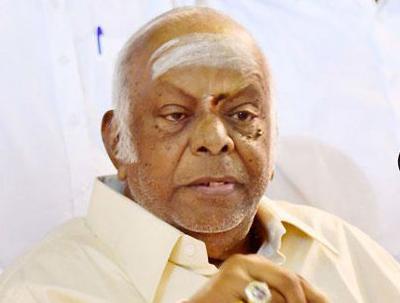For much of his life, M.A.M. Ramaswamy—former chairman of the $1.5 billion Chettinad group—displayed an uncanny ability to pick the winning horse.
Such was his success rate that the 83-year-old patriarch of the Tamil Nadu-based business group—one of the biggest and oldest in south India—was even listed in the Guinness World Records for having won more than 500 classic horse races.
But now, in his old age, the wheelchair-bound widower is perhaps regretting the biggest bet he ever placed in his life: His choice of heir.
In 1995, Ramaswamy adopted M.A.M.R. Muthiah—then a 25-year-old named Ayyappan—and made the young man his heir. A childless Ramaswamy wanted somebody to look after his expansive business empire, and was reportedly convinced to adopt Ayyappan after his wife found him as a suitable successor. Ramaswamy believed that Ayyappan was god-sent, since he carried the same name as Lord Ayyappa, a god mostly worshipped in India’s southern states.
Now, almost 20 years later, Ramaswamy accuses his son of cheating him and taking away his wealth. The saga took a new, dramatic turn after Ramaswamy publicly disowned Muthiah. “I have disowned him and do not wish to call him my son,” Ramaswamy told reporters on June 10. “He shall not perform any ceremonies or obsequies on my demise.”
The Chettinad group has business interests ranging from manufacturing cement to running power stations as well as education institutions. In 2012, Ramaswamy was India’s 88th richest man, according to Forbes.
Century old
The Chettinad group was formed in 1912 by Ramaswamy’s grandfather, Raja Annamalai Chettiar, who was part of the “Rajah family” among the Nagarathar—a mercantile community in Tamil Nadu. Annamalai Chettiar and his brother Ramaswami Chettiar had earlier founded one of India’s oldest banks, Indian Bank, in 1907.
The Rajah family is said to have once owned 100,000 acres of paddy fields in Myanmar in addition to 100 branches of the Bank of Chettinad (now defunct) in the country. They also held properties in Singapore, Malaysia, Indonesia, Vietnam, and Sri Lanka. The Rajah family also ran the famous Madurai Mills in partnership with the Harvey family of Scotland.
Ramaswamy’s house—the sprawling Chettinad Palace—located on the banks of Adyar river in Chennai, had in 1961 hosted the Duke of Edinburgh. The property, spread across 20 acres, is currently worth some Rs3,500 crore.
The usurper
The feud became public in July last year.
Ramaswamy had sought reappointment as the director of Chettinad Cement—the group’s flagship company—but shareholders voted against him in the annual general meeting. Instead, the group patriarch was selected as chairman emeritus of the company, with only limited powers. A former director, L. Muthukrishnan, was appointed chairman of the company while Muthiah continued as the vice chairman.
“I am still not able to understand what actually was the problem between us; all I know he (Ramasamy) is angry with me,” Muthiah said in an interview last week. “He is used to a dominant position all his life, doesn’t want to listen to anybody, including people from the community.”
Together with his wife, Geetha, Muthiah controls about 74% of the group’s equity, while Ramaswamy holds another 24% stake. In Chettinad Cement, Muthiah and his wife have a 33% stake. Ramaswamy has control of about 24% of the flagship firm. Ramaswamy’s wife, the late Sigapi Acchi, had transferred her 18% stake in the company to Muthiah’s wife before she passed away in 2006.
Much of the trouble between the father and son apparently started brewing after Ramaswamy’s wife passed away about a decade ago. “Till my wife died in 2006, there was no trouble,” Ramaswamy said in an interview. “I wasn’t aware that gradually Muthiah and his (biological) father slowly and quietly built up holdings in the group without my knowledge, with an intention to oust me.”
“On August 27, 2014, he carried out a coup against me, throwing me out as chairman of Chettinad Cement,” he explained. “Imagine being thrown out of your company by a usurper.”
In March this year, Ramaswamy filed a police complaint alleging that Muthiah’s men had attacked him and his personnels while Muthiah, on his part, claimed that the employees at the Chettinad Palace had blocked his entry, and his security personnels were only trying to protect him from attack.
“He has stopped even medicine supplies for me from Chettinad Health City for nearly three months now,” Ramaswamy said on June 10. Chettinad Health City is part of the Chettinad group.
The fight is now in the open and many from the Nagarathar community are trying to mediate the dispute. But not much seems to have moved. Ramaswamy has now declared AC Muthiah—his cousin and promoter of Southern Petrochemical Industrial Corporation—as his successor. He has also decided to annul his own adoption of Muthiah.
Another bet is seemingly underway—but the 100-year-old legacy of a storied business family is already tarnished.

